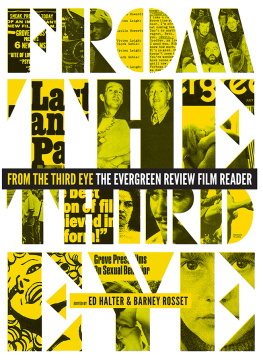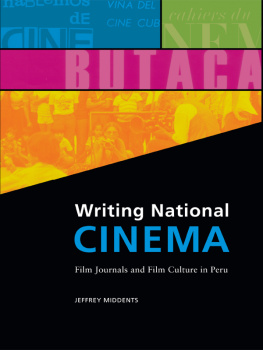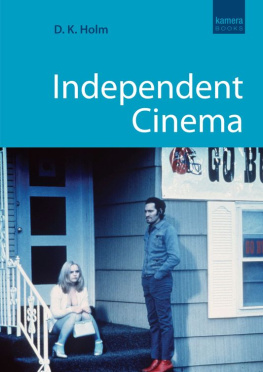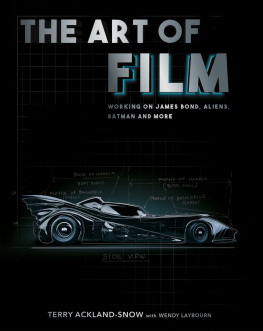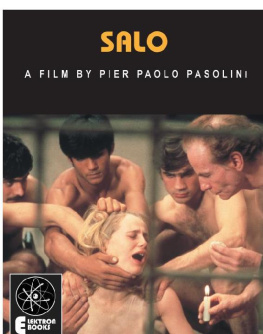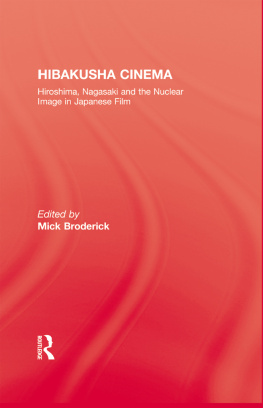All images were obtained from the personal collection of Barney Rosset (now the Barney Rosset papers at the Rare Book and Manuscript Library of Columbia University Libraries), with the following exceptions:
p. 10: Image of Barney Rosset courtesy of Astrid Myers
p. 70: Drawing courtesy of Jonas Mekas and Anthology Film Archives
p. 156: Image of Mister Freedom poster courtesy of Harvard Film Archive
p. 171: Image of The Man Who Lies poster courtesy of Harvard Film Archive
All rights reserved. No part of this book may be reproduced, stored in a retrieval system, or transmitted in any form or by any means, including mechanical, electronic, photocopying, recording, or otherwise, without the prior written permission of the publisher.
Names: Halter, Ed editor. | Rosset, Barney editor.
Title: From the third eye : the Evergreen review film reader /edited by Ed
Halter and Barney Rosset ; additional research by Matt Peterson.
Other titles: Evergreen review.
Description: Seven Stories Press first edition. | New York : Seven Stories
Press, 2017. | Includes bibliographical references and index.
Identifiers: LCCN 2017047397| ISBN 9781609806156 (pbk.) | ISBN 9781609806163
(ebook)
Subjects: LCSH: Motion pictures--Reviews.
Classification: LCC PN1995.F78453 2017 | DDC 791.43/75--dc23
LC record available at https://lccn.loc.gov/2017047397
CONTENTS
Introduction
Ed Halter
The Angry Young Film Makers
Amos Vogel
Jazz on a Summers Day
Jerry Tallmer
The Magic Box
Jerry Tallmer
Dragtime and Drugtime; or, Film la Warhol
Parker Tyler
Someday What You Really Are is Going to Catch Up with You
Michael ODonoghue
13 Confusions
Amos Vogel
The New American Cinema: Five Replies to Amos Vogel
Daniel Talbot, Parker Tyler, Annette Michelson, Richard Schickel, Gregory J. Markopoulos, with additional reply from Jonas Mekas
Chappaqua
Lawrence Shainberg
Turning the Camera into the Audience
Nat Hentoff
Norman Mailers Wild 90
Lita Eliscu
Warhols Nude Restaurant
Stefan S. Brecht
Vietnam Dj Vu: A Film Review of Godards La Chinoise
Lita Eliscu
The Edge
Lita Eliscu
Sex and Politics: An Interview with Vilgot Sjman
John Lahr
The Sixth New York Film Festival
Sidney Bernard
A Way of Life: An Interview with John Cassavetes
Andr S. Labarthe
Lola in LA: An Interview with Jacques Demy
Michel Delahaye
The Day Rap Brown Became a Press Agent for Paramount
Amos Vogel
Solanas: Film as a Political Essay
Louis Marcorelles
Easy Rider: A Very American ThingAn Interview with Dennis Hopper
L.M. Kit Carson
Participatory Television
Nat Hentoff
Rochas Film as Carnival
Frieda Grafe
Rimbauds Desert as Seen by Pasolini
Wallace Fowlie
Mister Freedom: An Interview with William Klein
Abraham Segal
Destroy, She Said: An Interview with Marguerite Duras
Jacques Rivette & Jean Narboni
The Man Who Lies: An Interview with Alain Robbe-Grillet
Tom & Helen Bishop
Do They or Dont They? Why It Matters So Much
Parker Tyler
Mandabi: Confronting Africa
Julius Lester
Seeing America First with Andy Warhol
Dotson Rader
It Could Only Happen in California
Dotson Rader
Womens Lib: Save the Last Dance for Me
Tom Seligson
Have You Seen It All, Dennis Hopper?
L.M. Kit Carson
Woodstock: An Interview with Michael Wadleigh and Bob Maurice
Kent Carroll
Mucking with the Real
L.M. Kit Carson
Film and Revolution: An Interview with Jean-Luc Godard
Kent Carroll
We: A Manifesto
Dziga Vertov
Papatakis: Tiger in a Think-Tank
Parker Tyler
Hollywoods Last Stand
Tom Seligson
Fonda, My Buddy
Seymour Krim
Eros and the Muses
Jerome Tarshis
The First Annual Congress of the High Church of Hard Core
Robert Coover
News from Phyllis and Eberhard Kronhausen
Sara Davidson
Those Homophile Husbands
Parker Tyler
Pasolinis Decameron
David Hamilton
Film: Freaks and Fellini
Nat Hentoff
Perverse Chic
Tom Seligson
A Transit to Narcissus
Norman Mailer

Banner for the Grove Press International Film Festival flying over the Evergreen Theaters marquee on East 11th Street in Manhattan

The first piece of writing on cinema to appear in the pages of Evergreen Review was The Case of James Dean by French filmmaker and philosopher Edgar Morin, featured on the cover of Evergreen No. 5, Summer 1958. The article was excerpted from Morins study The Stars: An Account of the Star-System in Motion Pictures, published by Grove in 1960.
Introduction
Ed Halter
Published by Grove Press from the late 1950s to the early 1970s, Evergreen Review is remembered as one of most important and influential journals of radical thought and politics, produced during the heyday of the American counterculture. Under the direction of Barney Rosset, Grove and Evergreen helped change the course of American publishing. Grove and Rosset grew famous for a long string of legal battles against censorship, fighting successfully to distribute banned books like D.H. Lawrences Lady Chatterleys Lover, Henry Millers Tropic of Cancer, and William S. Burroughss Naked Lunch, and promoting international authors like Samuel Beckett, Marguerite Duras, and Jean Genet to American readers.
But Evergreens substantial contribution to the literature of cinema has been largely overlooked, and Groves decisive role in the development of film culture has been nearly forgotten. During a turning point in film historywhen the primacy of Hollywood was challenged by television and the music industry, international directors, and the American undergroundEvergreen ran over a hundred essays and interviews about cinema. During this same period, Grove also branched out from traditional book and magazine publishing to become a groundbreaking film distributor, releasing new films from some of the eras most important international directors. One of its titles, the Swedish import I Am Curious (Yellow), had a profound impact on the role of government censorship in motion picture exhibition, creating far-reaching changes in the American film industry as a whole.
Evergreen published the bulk of its film writing from 1967 to 1972; these same years saw some of the most tumultuous political events of the latter half of the 20th century. As society unraveled, then found new shape, Evergreen rode a bubble whose buoyant currency was the utopian dream of revolution. Vigorous, smart, and politically engaged, Evergreens articles about cinema read like documents from not just another time, but another world: an alternate universe in which Jane Fonda and Dennis Hopper are the only movie stars worth mentioning, directors cite Mao Tse-tung and Eldridge Cleaver as primary influences, film festival soirees end in police raids, and sexual explicitness is seen as an act of political rebellion.

